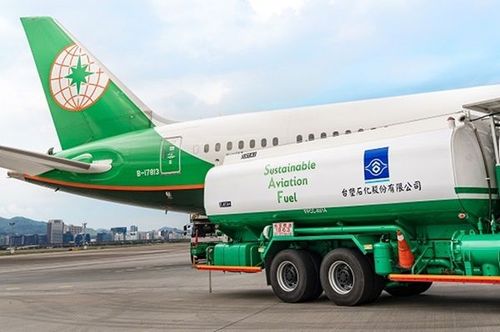Taiwan-based EVA Air signs 3 SAF agreements

SOURCE: EVA Air
April 28, 2025
BY EVA Air
EVA Air announced the signing of sustainable aviation fuel (SAF) procurement agreements with three major suppliers: Associated Energy Group LLC (AEG FUELS) from the U.S., COSMO Oil Marketing Co. Ltd. from Japan, and Formosa Petrochemical Corp. from Taiwan. This strategic move reaffirms EVA Air’s unwavering commitment to sustainability by expanding its SAF footprint and establishing long-term partnerships with global and local suppliers.
“Today, sustainable development is not just a choice—it is a responsibility,” said EVA Air President Clay Sun. “Our bilateral collaborations with AEG FUELS, COSMO, and Formosa Petrochemical Corporation reflect our commitment to net-zero emissions. By actively introducing SAF across our global network, we are reducing our operational carbon footprint and fostering transformation and growth throughout the aviation supply chain.”
Advertisement
Advertisement
As the world moves toward the shared goal of achieving net-zero emissions by 2050, SAF is regarded as one of the aviation industry’s most promising solutions for carbon reduction. EVA Air is in compliance with the European Union’s (EU) SAF supply policy, and all flights departing from Europe have been operating with a 2% SAF blend since the first quarter of this year. The new agreements mark the next phase of EVA Air’s sustainability journey, as it will independently and regularly begin SAF integration at key hubs in North America, Japan, and Taiwan starting in the second quarter of 2025. These actions aim to substantially lower flight emissions and lay the foundation for broader SAF adoption in the future.
EVA Air is partnering with three major suppliers. AEG FUELS is a globally recognized aviation fuel provider with an extensive and reliable international logistics network. COSMO, one of Japan’s leading energy companies, will supply SAF in the Kansai area, where the Osaka-Kansai Japan Expo will be held until October 13, 2025. Formosa Petrochemical Corporation is the first company in Taiwan to supply SAF produced in-house, reinforcing local supply chain resilience. These collaborations are strengthening EVA Air’s fuel supply flexibility, expanding SAF adoption across the Asia-Pacific region, and accelerating the sustainable transition of aviation fuel in the region.
As a significant milestone in advancing SAF adoption, EVA Air successfully introduced domestically produced SAF on April 23, 2025, as part of the Civil Aviation Administration’s pilot program for SAF usage. The fuel was blended into two international flights: BR156 from Taipei Songshan Airport to Seoul Gimpo International Airport, and BR148 from Kaohsiung International Airport to Kansai International Airport in Japan. This marks the official launch of SAF application at Taiwan’s local airports. The initiative demonstrates EVA Air’s strong commitment to sustainability and highlights the maturity and resilience of Taiwan’s local SAF supply chain.
Advertisement
Advertisement
EVA Air has made significant strides in sustainability in recent years. On the environmental front, the airline has implemented numerous energy-saving and carbon-reduction initiatives, including fleet modernization, adopting new-generation fuel-efficient aircraft such as the Boeing 787 and Airbus A350-1000, and optimizing flight routes to reduce fuel consumption and emissions.
Looking ahead, EVA Air will continue to expand its use of SAF and actively engage in global sustainability initiatives. The airline also aims to strengthen collaboration with partners to collectively usher in a new era of sustainable aviation.
Related Stories
Neste and DHL Express have strengthened their collaboration with the supply of 7,400 tons (9.5 million liters) of neat, i.e. unblended, Neste MY Sustainable Aviation Fuel to DHL Express at Singapore Changi Airport starting July 2025.
CoBank’s latest quarterly research report, released July 10, highlights current uncertainty around the implementation of three biofuel policies, RFS RVOs, small refinery exemptions (SREs) and the 45Z clean fuels production tax credit.
The U.S. Energy Information Administration maintained its forecast for 2025 and 2026 biodiesel, renewable diesel and sustainable aviation fuel (SAF) production in its latest Short-Term Energy Outlook, released July 8.
XCF Global Inc. on July 10 shared its strategic plan to invest close to $1 billion in developing a network of SAF production facilities, expanding its U.S. footprint, and advancing its international growth strategy.
U.S. fuel ethanol capacity fell slightly in April, while biodiesel and renewable diesel capacity held steady, according to data released by the U.S. EIA on June 30. Feedstock consumption was down when compared to the previous month.
Upcoming Events










